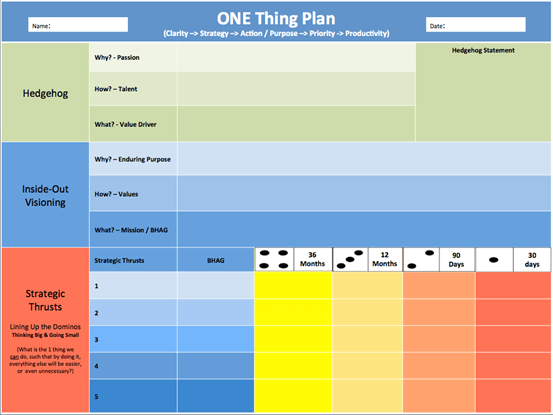The top 5 characteristics of leadership and how to master them
The top 5 characteristics of leadership: the importance of self-management, personal accountability, goal achievement, interpersonal skills and persuasion
There are five defining characteristics of leadership: the ability to manage oneself, to hold oneself personally accountable, to achieve goals, interpersonal skills and the ability to persuade.
According to The Complete Leader, self-management is the ability to demonstrate self control and manage time and priorities appropriately.
A person who has mastered the skill of self-management is adept at working independently in order to pursue business objectives.
The second defining characteristic of world class leaders is their ability to hold themselves personally accountable.
As Ron Price describes it, personal accountability is the willingness and ability to take personal responsibility for processes, decisions, actions and results created by you.
This is a really important skill for a leader to develop, because it sets the scene for how others should act.
The third characteristic of world class leaders is goal achievement. This is defined by The Complete Leader as the ability to execute a plan and get the desired results.
This requires both successful self-management and personal accountability and is made easier by flexibility and resiliency. Put simply, goal achievement is the final result of leaders successfully leading themselves.
A person who has mastered the skills associated with goal achievement creates goals that are realistic. They take action towards their objectives and they start working on them without delay.
Interpersonal skills are undoubtedly one of the most critical characteristics of leadership.
This has been defined by The Complete Leader as the ability to effectively communicate with others, build rapport and relate to different people from different backgrounds and personality styles.
The most defining aspect of this skill is the ability to connect with others. It goes hand in hand with other competencies such as empathy, understanding and evaluating others, tact and diplomacy.
Finally, when discussing the characteristics of leadership, the ability to persuade cannot be overlooked.
The Complete Leader define this as the ability to convince others to change – be it their actions, opinions, behaviours or decisions.
In fact, it can be very difficult to lead if you are not persuasive. To influence people, they have to believe in you and what you stand for.

The top 5 characteristics of leadership #1: SELF-MANAGEMENT
Self-management is a critical skill for leaders to develop, because who wants a leader who is unreliable, impulsive, lacking in self-control and uncertain of what is a priority?
They can identify their priorities and cut out distractions to carry out high quality work in a specified amount of time.
The future will see the importance of this skill being magnified due to the increase in remote working and a desire to work ever faster.
So, what does a lack of self-management mean? Price Associates make the point that leaders sometimes don’t realise that they have a problem with their self-management skills. Because they may be constantly dealing with one emergency or another, they may not have time to reflect.
But successful leaders can manage themselves and their emotions and they know where their organisation is going and what they are trying to achieve.
When they have a clear direction they are going in, the team will go along with them. If they don’t, the team may become disengaged or discouraged. Self-management is one of the critical characteristics of leadership.
How can I develop my self-management skills?
To develop your self-management skills, put some of the points below into practice.
Develop self-control
The first step to developing skills in self-management is to work on taking back your power and developing self-control.
The is defined in The Complete Leader book as the ability to control your desires, emotions and behaviours, instead of letting them control you.
This can be done by looking after your physical health (through adequate sleep, a healthy diet and exercise), managing stress (perhaps by meditation) and proactively choosing your responses as opposed to simply reacting.
What can you choose to do that is within your control, to move your work forward?

Manage time and priorities
Once you know what your priority is and have established timelines for project completion, a good idea is to put together internal checkpoints to make sure that you stay on schedule.
A good tip from Price Associates is to keep an electronic list of tasks to be completed. Label each task as either A (Critical to Survival), B (Important to Success), C (Somewhat Important) or D (Not Important or Unknown Importance).
This will help you identify what really needs to be done and what can wait. Keep it all in the one place and on the one app for clarity.
Secondly, it’s a good idea to spend 15-30 minutes every morning organising and updating your task list. Consider your long-term goals and how you choose to manage yourself and relate to others.
Keep distractions to a minimum
Avoid disruptions and time-wasters. Understand where you work best and under what conditions and aim to replicate them. Perhaps you work best in the morning or in the evening when everybody else has left the office.
Plan your schedule a week in advance with your priorities listed in it. Pay attention to any discrepancies between how you intended to spend your time and how you actually spent it.

Keep active
When in doubt, act. As the saying goes: “A grade-B plan with grade-A execution beats a grade-A plan with grade-B execution”.
When things go wrong, you must keep moving. Hold yourself to your standards and take even the smallest steps towards your goals. This could give you inspiration for the next steps to take.
The Complete Leader suggests asking yourself the following questions: “What do I need to do (observable behaviours) this week? How will I measure success?”
The top 5 characteristics of leadership #2: PERSONAL ACCOUNTABILITY
Personal accountability – a measure of the capacity to be answerable for personal actions – is vital for leadership success.
Personally accountable leaders set the priority of what is the most important thing to be done and where they can have maximum impact. They make sure they are giving the best version of themselves as an accountable leader.
They can be counted on to do whatever it takes. Personally accountable leaders admit their mistakes, bounce back after setbacks and project confidence and self assurance in their personal capabilities.
They achieve results in often the most adverse of circumstances.
This is particularly important for a leader, because after awhile, results, not effort, become the most notable indicator of success. And if a leader doesn’t produce results, it creates a culture where it is ok to consistently make excuses.
As Ron Price says, the moment you quit making excuses is the moment you begin to become a more accountable leader. It all starts with attitude and your willingness to focus.
How can I develop my personal accountability skills?
To develop your personal accountability skills, put some of the tips below into practice.
Practice the referability habits
I personally love Dan Sullivan’s referability habits, which are: show up on time, do what you say, finish what you start and say please and thank you.
By consistently practicing the four habits above, you will become known as a leader who is personally accountable. You will be someone that others can rely on.
The characteristics of perseverance, tenacity, urgency and reliability are critical for leadership success.
Know what is expected of you
One key way to avoid placing the blame on someone or something else is to know from the start of a project or task exactly what others expect of you.
The Complete Leader suggests asking stakeholders the following question: “What are the key results that will reflect superior performance in my job, to this project or for our team?”
People may have differing expectations, but by clarifying in advance, it makes it easier to hold yourself accountable and avoid blaming after the fact.
Don’t be afraid to admit mistakes
Although guilt, ego and pride can make it difficult, owning up and admitting mistakes is critical for personal accountability.
Be transparent. Use mistakes as an opportunity to grow and learn how things could be done better in future.
Go above and beyond the line of duty
Truly personally accountable individuals do more than what is asked of them to get the job done successfully.
Focus your energies on goals that are important to the team. Aim to make your job more rewarding by redefining your role and look at novel ways of doing things to achieve maximum results.
Work like a volunteer – as if you were somebody doing the job because they want to, not because they need to in order to pay the bills.
Establish ambitious and challenging goals
Don’t be afraid to dream big and envision a bright future for your organisation. Become known as somebody who sets and achieves ambitious and challenging goals.
Which brings me to the third most important skill that world class leaders possess: goal achievement.
The top 5 characteristics of leadership #3: GOAL ACHIEVEMENT
Goal achievement is essential for successful leaders who can lead themselves.
People who have good goal achievement skills are adept at focusing their efforts and using resources to achieve optimal results. They focus on what is truly important and they avoid majoring in minors.
Leaders who are particularly skilled at goal achievement have a ‘big G orientation’ as opposed to a ‘little g orientation’. This means that they are intrinsically motivated to satisfy goals. Instead of working to just avoid failure, they work to achieve bigger and better things.

How can I develop my goal achievement skills?
If goal achievement is something that you would like to work on, commit to implementing some of the practices below.
Be disciplined. Develop a clear strategy and process
When it comes to goal achievement, it is essential to set a strategy and process in place from the start.
What exactly do you want to achieve and how will you measure and celebrate milestones along the way? You should be able to clearly explain this to anybody who asks. A great way to start is to set SMART goals.
Set SMART goals
SMART goals are goals that work. Successful goal achievers set goals that are Specific, Measurable, Action-oriented, Realistic and Time-bound.
It should be clearly stated so that you know when it has been achieved, there should be an objective measurement attached, it should be completable by observable behaviours, it should be realistic and it should have a deadline.
Make sure your goals are visible
Always write your goals down somewhere where you can see them. A good idea recommended by Mindy Bortness, faculty member of The Complete Leader, is to create a vision board.
Cut or print out images or quotations related to what you want to achieve in your personal and business life and place them in your office.
This can remind you of what you want to achieve with your life and can keep you on track with your goal achievement.

At ONEFocus we use a ONEThing Plan model which allows us to write our BHAG (Big Hairy Audacious Goal) with clear action steps for how to achieve it.
Get an accountability partner
It’s a good idea to regularly check in on how you are doing with your goal achievement in the various aspects of your life.
This becomes much easier if you have some help along the way. Find an accountability partner who could assist you with this; somebody that you could contact on a regular basis and hold you accountable to your goals and objectives.
The top 5 characteristics of leadership #4: INTERPERSONAL SKILLS
Interpersonal skills are undoubtedly one of the vital characteristics of leadership.
As human beings we have opportunities to practice this skill in any social setting, any time we interact with other people.
A person with particularly refined interpersonal skills is both good at listening and speaking with others. They know themselves well and are empathetic and sensitive to the needs, feelings and emotions of others.
This is an important skill for working and communicating effectively with others at various levels of the organisation.
As Whit Mitchell, faculty member of The Complete Leader points out, the leaders we remember are those who showed an interest in our lives outside of work, who genuinely listened and cared about our hobbies and who we are as a person.
We tend not to think much of leaders who can’t listen or empathise.
Interpersonal skills are one of the most important characteristics of leadership because if a leader values their followers, they will be more committed and interested in giving their best to the organisation.
They will feel more personally connected to the leader and to the organisation’s mission. Improving your interpersonal skills can work wonders for the engagement levels of staff.
How can I develop my interpersonal skills?
If your interpersonal skills could do with being updated or improved, put some of the tips and tricks below into practice.
Develop a connection with others
Ron Price and Randy Lisk, in their excellent book The Complete Leader, recommend the following teaching tool for forming connections, called FORM:
Family: Enquire about the family of the person you meet
Occupation: What do they enjoy about their career and what have been their experiences in the past?
Recreation: Do they have any burning hobbies or anything they love to do outside work?
Mission: To really build a connection, ask the person about what matters most to them
Interpersonal skills only truly work when you are genuine. Take an interest in the people you meet and you will find that your interpersonal skills and your relationships will improve.
Join a mastermind group or an organisation
Are you imbalanced in your speaking or listening skills? Or maybe you just want to improve generally. Either way, a good option is to join a group that will help you practice these skills.
DeliberateCEO is a mastermind group in Ireland where CEOs can meet, form relationships, present ideas and problems, and listen to those of others.
In this format, leaders can practise their listening and speaking skills and can get some valuable real-time feedback in a positive environment. When feedback does come, be open to it and commit to making improvements.
Consider joining a mastermind group near you. See it as an investment in your own development.

Be authentic online
Another great tip recommended by The Complete Leader is to manage your online self. See your social media platforms as a way to portray the real you, and see every post, every comment and every engagement as a branding exercise.
The persona you portray should be the real you, however. If you prefer to keep professional conversations and personal conversations separate, then manage your connections in this way too.
The top 5 characteristics of leadership #5: PERSUASION
The ability to persuade people is one of the most fundamental characteristics of leadership. When Martin Luther King Jr. stood up and gave his ‘I have a dream’ speech at the 1963 Washington D.C. civil rights march, it was a huge success.
He drew his audience in by his ability to persuade and appeal to the emotions, logic, reason and desires of the people who were listening to him.
So why is it that King was the ideal poster boy for many of the most essential characteristics of leadership? Because he had followers.
The best leaders have followers who choose to follow and who believe in the mission of the leader. This is why persuasion is so important. Ethical, persuasive leaders can rally people behind a goal.
They communicate well, listen to and understand the needs of others and can appeal to different audiences without appearing false.
The best leaders can get people to stand up and say ‘I, too, have a dream’.

How can I develop my persuasion skills?
Persuasion is one of the characteristics of leadership that is closely linked with interpersonal skills, listening skills and the ability to be diplomatic.
To improve your skills of persuasion, commit to putting the tips below into action today.
Learn from others
If you think you could do a better job of persuading the people around you, watch closely how successful persuaders do it.
Persuaders are adept at speak the language of those they are influencing, the message resonates because they appeal through logic and emotion.
Have you ever found yourself agreeing to something that you never thought you would be able to do, because somebody you respect believed in you and influenced you to do it?
Imagine you have always wanted to skydive but, at the same time, the idea scares you half to death. A few months down the line, a charity skydive event comes up and your colleague remembers how you mentioned that it is a dream of yours.
They persuade you by being realistic and logical about the possible dangers, but then present you with statistics showing how small the chance of danger actually is.
They then use personal stories of how much they enjoyed it and how worthwhile the charity is. You feel empowered and start to think that maybe this is something you could actually do. You would easily be persuaded wouldn’t you?
Observe great persuaders in action and try to pick up some tips from them.
Be credible and believe in your message
To persuade others, you must first be credible. Know what you are talking about, strengthen your reputation with those who already know you or those who are just meeting you, as people will often make up their minds about your credibility before you even begin trying to persuade them.
As Aristotle once said, ‘Character may almost be the most effective means of persuasion’.
Keep your message simple, believe in it and make sure it makes sense. Don’t be afraid to put some passion behind your persuasion. Let people SEE how much you believe in what you are talking about.

Don’t be put off by resistance
Remember that any time anybody has tried to do anything great, there have always been people opposed to the idea.
Expect people to resist. Instead of reacting angrily or passive aggressively, treat them with respect and understand their approach.
As The Complete Leader recommends, treat them as your allies and do your best to help them overcome their resistance.
Final thoughts…
Being able to lead yourself is a key element of leadership. This comes in the form of self-management, personal accountability, the ability to set and achieve goals, interpersonal skills and persuasion.
To develop your self-management skills, work on developing self control, managing time and priorities, keeping distractions to a minimum and taking action.
Personal accountability can be improved by practicing the referability habits, knowing what is expected of you, admitting when you make mistakes, going above and beyond what is expected of you and establishing ambitious goals.
Goal achievement is something that can be developed by setting up a clear strategy and process, setting SMART goals that are visible and getting an accountability partner to help you.
To work on your interpersonal skills, work on developing a connection with others, join a group or organisation and be authentic online.
Finally, to improve your persuasion skills, learn from others, be credible and believe in your message and don’t be put off by resistance.
So which of these practices would elevate your leadership skills and how can you implement them today?
10 Things Successful People Do Every Day
What if there was a secret formula for success that you could copy? Kevin Kruse best selling author recently interviewed more than 200 highly successful people to find out what their number 1 secret to productivity? These people included 7 billionaires and 13 olympians. The answers have been distilled into 10 Simple Steps you can follow to achieve your own success.
5 mistakes people make with the DISC profile
When you are hiring, you need to use more than DISC. DISC is outwardly observable behavioural tendencies. What goes on beneath the surface is harder to read but even more powerful. What if you could see what a person values and is driven by, be it money, status, helping others? How much engagement could you get from your employees if you had this information at your finger tips. Using DISC correctly and in conjunction with the other TTI Tools is essential for your organisation’s success.
3 Easy Steps to Building a Solid Company Culture
Companies need to reimagine how they attract – and retain – employees by giving them what they desire, resulting in keeping them happier and more engaged. I am unique. So is every other employee. Companies would be wise to get to know their employees on a personal level and find out what is truly important to each and every one of them. Then, create a unique plan for each person that helps the employee achieve what he or she strives to achieve.

Discover Your Leadership Style TODAY!
- First step to being a leader is knowing yourself. If you don’t understand yourself how can you understand others? Learn to understand others better.
- Learn what your true behaviours and driving forces are.
- Identify what leadership competencies you are strong in and where you can improve.





